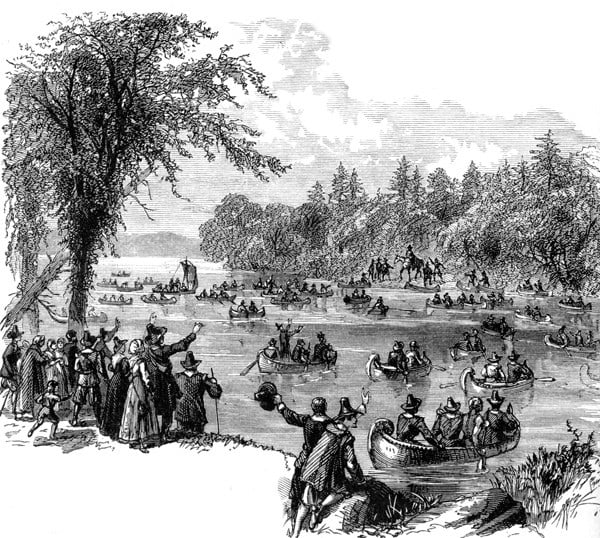By Catherine Streich
A recent Change.org petition calling for the removal of “and Providence Plantations” from the state’s official name has garnered thousands of signatures. The petition has even gotten Gov. Gina Raimondo’s attention – she suggested last week that the issue appear on the 2020 ballot. This is not the first time that Rhode Island’s full official name has come under scrutiny for its connotations of slavery. The previous referendum on the name change appeared as Question 1 on the Rhode Island statewide ballot in 2010 and was rejected by an overwhelming majority. Opponents of the change often cite the fact that ‘plantation’ in this context refers to a settlement, not slavery, and suggest that changing the name would be erasing the past. The phrase’s culpability aside, the debate over the suggested change does raise questions about Rhode Island’s history, particularly in relation to slavery, and begs the question, how much do we really know about Rhode Island’s involvement in the institution of slavery?
 Although it is rarely mentioned, taught, or studied, Rhode Island played an extremely important role in the American slave trade. In fact, Jay Coughtry, author of The Notorious Triangle: Rhode Island and the African Slave Trade, points out, “Rhode Island was the most important American carrier of African slaves” and that “from 1725 to 1807, what has been called the ‘American slave trade’ might better be termed the ‘Rhode Island slave trade.’” He says that while other places in New England engaged in some slaving, “only in Rhode Island … did the trade assume long-term social and economic significance” and “only in Rhode Island was there anything that can properly be termed a slave trade.”
Although it is rarely mentioned, taught, or studied, Rhode Island played an extremely important role in the American slave trade. In fact, Jay Coughtry, author of The Notorious Triangle: Rhode Island and the African Slave Trade, points out, “Rhode Island was the most important American carrier of African slaves” and that “from 1725 to 1807, what has been called the ‘American slave trade’ might better be termed the ‘Rhode Island slave trade.’” He says that while other places in New England engaged in some slaving, “only in Rhode Island … did the trade assume long-term social and economic significance” and “only in Rhode Island was there anything that can properly be termed a slave trade.”
The Ocean State, while boasting an extensive amount of coastline and harbors, had few exploitable natural resources. It was this “ lack of exportable or salable goods that led Rhode Islanders into the dubious, illegal, and immoral world of slave trading.” Overall, “Rhode Islanders transported about 106,000 slaves,” says J. Stanley Lemons, professor emeritus at Rhode Island College.
While slave labor was used on plantations in southern Rhode Island, and the state’s involvement in the slave trade as ship builders, financers, and insurers was significant, Rhode Island’s deepest implication in the institution was through its role as the principal producer and seller of the rum that functioned as a vital corner of the triangular trade.
The infamous Rhode Island rum was made from molasses produced on sugar plantations in the West Indies, which made its way to the state’s many distilleries concentrated in Providence and Newport. Coughtry notes that Rhode Island’s extremely high volume of quality rum production meant that “Rhode Island rum became an indispensable local currency wherever slaves were bought and sold.” The rum was sent to Africa to be traded for slaves. “Rhode Island merchants monopolized the trade in spirits along the West African [coast],” writes Coughtry. The ships, with their alcoholic cargo turned human, sailed for the Caribbean, where the enslaved people were exchanged for molasses. Finally, the ships sailed north to the Ocean State to begin the cycle again.
Rhode Island’s most lauded institution of higher education is also implicated in the slave trade. In his book, Ebony and Ivy, historian Craig Steven Wilder points out that Rhode Island was home to “the most active slaving house in the nation, the DeWolfes.” This Bristol-based family, along with the Browns (of Providence), who funded several disastrous journeys resulting in the deaths of captive slaves, became “the new patrons of higher education” in Rhode Island, going on to finance, build, and give a name to Rhode Island’s flagship educational institution, Brown University. Not only did funds for Rhode Island universities come from slave trading, but slave labor was also used to build Brown. When residents of towns like Newport and Providence were asked for donations for the fledgling college, “residents donated the labor of their slaves.”
So, does this extensive and appalling history of Rhode Island’s involvement in the institution of slavery have anything to do with the “Providence Plantations” part of the state’s name? Not really.
Rhode Island’s mouthful of a name is the result of the state’s dual origins. Roger Williams founded a settlement called Providence Plantations in 1636, while Anne Hutchinson and her followers founded a separate settlement a year later, on what is now Aquidneck Island, but was known at the time as Rhode Island. When Williams went to England to apply for a royal patent for Providence Plantations, he took along Rhode Island’s application and came back with a patent for one united colony rather than for two separate colonies. Whether there was a conscious decision to unite the settlements or if the union was caused by a clerical error in England, the settlements were joined by the official charter in 1644 and this union resulted in the state’s double name, “Rhode Island and Providence Plantations,” which recognizes both entities.
At the time Roger Williams formed his settlement, the term “plantation” had nothing to do with slavery. Former Gov. Donald L. Carcieri (who hails from East Greenwich) defended the state’s name the last time it came under fire, saying that “the historical definition of the word ‘plantation’ is ‘settlement or colony’ … and is no way in reference to the most modern definition associated with slavery.”
However, the “gentler” interpretation of the word “plantation” still has serious implications–namely, of Native American land theft. In her New York Times piece, “A Plantation to Be Proud Of,” writer Sarah Vowell states, “In his farewell sermon to the colonists leaving England to settle Massachusetts Bay in 1630, ‘God’s Promise to His Plantation,’ the Rev. John Cotton evoked the word’s biblical roots, quoting the second Book of Samuel: ‘I will appoint a place for my people Israel, and I will plant them.’”
This biblical root for the word plantation implies that early settlers who came to America in search of religious freedom, like Roger Williams, understood that their occupation of the appointed place was God-ordained, that they had a divine right to settle and grow their population. The problem with the idea of religious plantation was that it gave colonizers a firm moral basis on which to justify their taking of Narragansett lands.
Even the use of the word “plantation” to refer to farming and planting is problematic in Rhode Island, given that in order to create a plantation farming colony, settlers ended up taking tribal land from the native Narragansetts. Between Roger Williams’ arrival and the end of King Philip’s War (about 40 years), the settlers had taken nearly all of the Narragansett territory.
After the war, many members of the Narragansett tribe were captured and sold as slaves to other colonies and even to the West Indies. Enslavement of the Narragansett was common throughout early Rhode Island history. There are records of Narragansett slaves in Providence, Warwick, and “most notably, in South Kingstown, where a census in 1730 showed the community to hold 223 Narragansett slaves. ” (Geake, The Narragansett).
So, does the phrase “Providence Plantations” explicitly refer to slavery? Maybe not. Does it evoke, both through modern connotations of the word plantation and historical denotations of the term, Rhode Island’s dark and hidden history of involvement in the institution of slavery and Native American land disposession? Absolutely.
Recent protests and political activism in the state show that the ugly truths of Rhode Island’s past, symbolized in some ways by the state’s name, have not gone away. While shortening the name may not be the answer, the debate and the high number of Rhode Islanders demanding change certainly calls for acknowledgement of the state’s history and discussion about the state’s colonial legacy and its effects on the present.
One potential course of action could be to develop mandatory courses or modules on Rhode Island history in schools, with a focus on bringing some of these little-known yet extremely important stories to light, particularly in relation to slavery and settler colonialism. Another idea would be to erect a monument to the 106,000 slaves transported by Rhode Island slavers. Most importantly, the state government should see the interest in the name change as a call to action, to seek to understand the issues faced by those whose historic mistreatment in our state has led to this search for justice and to enact meaningful change.
Catherine Streich graduated from Wesleyan University in 2019 with a degree in American Studies and has conducted historical research as an intern at the U.S. Embassy in Madrid. She is also a member of the EGHS Class of 2015.






 Subscribe
Subscribe
Great article and very well written!
Great read! Would love to see more content like this
Agreed!
Great read Catherine.
Very good article. Thank you!
Fabulous article! So much I didn’t know!
Fascinating article. Well done!
Might this article be submitted to the Providence Journal and other RI publications, perhaps as an op-ed? Its nuances of thought evoke such valuable insights!
In the USA, ‘Northerners’ are quick to criticize ‘Southerners’ who display symbols of the Confederacy and exalt the days of slavery. Let’s eliminate ‘Plantations’ from RI’s official name, lest we be hypocrites.
Very informative article. I am not a native Rhode Islander and was not aware of any of this. Thank you for this educational history lesson.
Great article. Thank you!
I agree this is an excellent article that discusses extremely important but little-known history. I would like to add one idea to the discussion. Under the leadership of Roger Williams, a man centuries ahead of his time, the colony of Rhode Island and Providence Plantations was the first to prohibit slavery by law. It is a tragic irony that the law was flouted and Newport later became a center for the trans-Atlantic slave trade, but this shows us that there were people in Providence who were fighting for the idea that all Rhode Islanders deserve to be treated equally, regardless of race. Williams was also a leader in advocating for the property rights of Native Americans (a battle he also lost, clearly) and most famously for religious liberty and the separation of church and state.
So I think by removing the word “Plantations” from our name, we do more than just avoid an unfortunate misunderstanding or painful reminder—we smooth over the details of Rhode Island’s complicated past and make it seem more homogenous, as if racism and slavery were universally agreed upon, with no objections by anyone. Such a view of history poses a significant problem to the cause of racial justice, because it implies that everyone in the past must have been just a “product of their time” and that none can be held accountable for the evils that they committed or tolerated. But what Providence Plantations and Roger Williams show us is that this is not true—some people rose above the evils of the times, and others chose to participate.
What I hope we can all agree upon is that Rhode Islanders deserve a museum that showcases this history!
I propose consideration be given to the idea mentioned in this excellent article to a memorial to
the estimated 106,000 slaves which transited from their African homeland to slavery in the
Americas. It should be located either in Newport or Bristol – centers for the RI slave trade.
I believe Rhode Islanders would donated readily to such a memorial.